Displaying 1 - 10 of 38
UNODA joins global efforts for 16 Days of Activism Against Gender-Based Violence
From 25 November to the 10 December, the United Nations Office for Disarmament Affairs joined UN Women, the Secretary-General’s Say NO –UNiTE to End Violence against Women Campaign and the International Action Network on Small Arms (IANSA) for the 16 Days of Activism Against Gender-Based Violence Campaign 2020. 16 Days of Activism is an annual, worldwide campaign calling for the elimination of all forms of gender-based violence (GBV). Throughout the campaign period, UNODA published over 40 social media posts in English, French and Spanish, joining…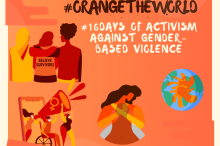
Disarmament4Educators Kicks Off with Online Roundtable Series
“What is the biggest challenge you see in the next year for building up disarmament education in your organization?” Disarmament experts and educators tackled this and other topics at the recent Disarmament4Educators Roundtable Series, organised by the United Nations Office for Disarmament Affairs (UNODA). The Roundtable Series, which took place from 18 November to 9 December 2020, are part of the ongoing Disarmament4Educators project, supported by generous donations from the Government of the Republic of Korea and Rissho Kosei-kai. By combining online learning…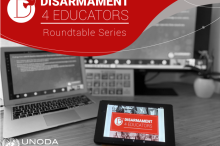
#Youth4Disarmament awarded Billion Acts of Peace Award for Best Coalition Building Project 2020
The #Youth4Disarmament initiative has been recognized as Best Coalition Building Project of 2020 by a Billion Acts of Peace. The initiative was nominated along with eleven other inspiring projects, chosen from more than eight million Acts for Peace. Billion Acts of Peace, an initiative of the PeaceJam Foundation, is a global movement led by fourteen Nobel Peace Prize Winners and youth around the world with the ambitious goal of creating One Billion Acts of Peace by 2021, and in doing so, inspiring everyday people to change the world – one Act of Peace at a time. Among those who…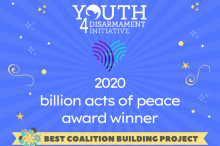
UNODA and Peace Boat launch new disarmament education guidebook
The United Nations Office for Disarmament Affairs (UNODA) joined Peace Boat on 3 November to jointly launch a new guide to the international non-governmental organization’s unique approach to disarmament education. Called “Navigating Disarmament Education: The Peace Boat Model”, the publication was the latest addition to a special series published by UNODA as a platform for civil society to express views on disarmament and related matters. The book introduces pedagogical methods developed by Peace Boat through its 37 years of experience hosting disarmament…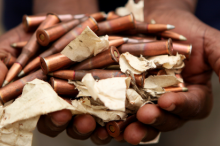
In Southeast Asia, data-science trailblazers train to innovate for the global good
Student finalists in a Southeast Asian data analytics competition trained last month to maximize the positive impact of their future work and reduce risks of accidental harm. The ethical and disarmament implications of new technologies and innovations were at the centre of a remote interactive workshop convened by the United Nations Office for Disarmament Affairs (UNODA) with the Association of Southeast Asian Nations (ASEAN) Foundation and with SAP, a software development company. The event on 19 November 2020 brought together more than 20 science, technology,…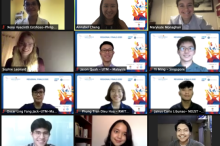
Five things to know about the worldwide effort to eradicate cluster bombs
A decade has now passed since an international treaty took effect banning cluster munitions—shells that can blanket wide areas with miniature explosives and cause devastating harm to civilians, even after the fighting ceases. States that have joined this treaty, called the Convention on Cluster Munitions (CCM), meet every year to discuss their progress towards eliminating these weapons. Clearance in Lebanon. Credit: MAG Lebanon. This November, States parties will begin the treaty’s second Review Conference, held every five years, under the Presidency of Ambassador…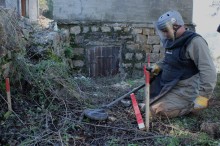
Seeking to “Silence the Guns in 2020”, seven African States ramp up efforts to collect illegal firearms
Seven African States are finishing four months of activities to collect illegally held firearms from their citizens in connection with an African Union-backed amnesty period in September, called “Africa Amnesty Month”. Working with local and international partners, the countries are alerting residents to the dangers of illegal small arms and ammunition through both targeted media blitzes and in-person education campaigns that extend from major cities out to distant villages. Meanwhile, officials are labouring behind the scenes to securely collect, record, store and ultimately destroy…
In push for gender equality, Central African Republic eyes vital role of small arms control
Officials in the Central African Republic held a multi-day training last month to further harness their small arms control practices and policies in support of gender equality and related priorities. Over three days of presentations and interactive exercises organized in Bangui by the United Nations Regional Centre for Peace and Disarmament in Africa (UNREC), Government and civil society participants boosted their readiness to systematically weave gender considerations into national and local small arms control efforts, in line with the women, peace and security agenda. The training was…
Lawmakers and experts unveil handbook on parliamentary action for disarmament
On 5 November 2020, four international parliamentary organizations and two international policy bodies launched a parliamentary handbook to support disarmament for security and sustainable development. The approach and focus of the new publication draw primarily from Securing Our Common Future: An Agenda for Disarmament, released by the UN Secretary-General in 2018. It also considers how disarmament is connected with sustainable development and with pandemics. Called Assuring our Common Future, the handbook provides background and examples of effective policies and…
Ammunition management, a male-dominated field, seeks to better understand its impacts on women, men, boys and girls
Poorly managed ammunition can explode suddenly or fall prey to theft, endangering women and men in distinct ways that demand more attention, experts said at a virtual panel discussion in late October. The ammunition-management sector could help save lives by adopting policies and practices that are gender-sensitive, according to participants in the exchange organized by the United Nations Office for Disarmament Affairs (UNODA) and the Small Arms Survey, an independent research institute. Their discussion, which drew about 100 online participants, coincided with the launch…